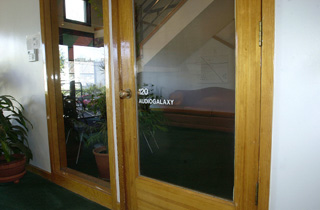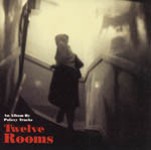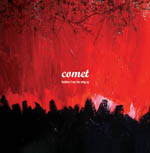I Want My MP3s
Audiogalaxy, Austin's onetime file-sharing supernova
By Michael Chamy, Fri., Jan. 31, 2003

The offices at 1135 W. Sixth are quiet these days. Not that Audiogalaxy ever caused much of a ruckus in the middle of a genteel neighborhood just off Lamar. Behind the F8 Fine Art Gallery, the firm's doors face residential-style fences offering no back way out of the narrow parking lot. The location manages to stay camouflaged in the middle of an open city block. One wonders if founder and CEO Michael Merhej chose the inconspicuous rear office back in 2000 in anticipation of the international attention Audiogalaxy would receive.
Inside, the handful of remaining employees left over from last June's mass exodus keep the Audiogalaxy Web site up and running, even as they make arrangements to sell off the servers and equipment that fell into disuse after the company's popular Satellite file-sharing program was permanently taken offline.
June 17, 2002, was the day the gavel dropped on Audiogalaxy, courtesy of Hilary Rosen and the Recording Industry Association of America. It was the end a brief, yet memorable, run as the bright, shining hope of millions of users worldwide who download free music to their computer hard drives. Following the court-mandated demise of original file-sharing juggernaut Napster in early 2001, Audiogalaxy proved to be not only an adequate replacement, but a vast improvement in many areas, thanks to the most user-friendly, comprehensive, and responsive music file-sharing system ever available to a mass Internet audience.
"If you want an example of file sharing done right, Audiogalaxy is the model," says Eric Garland of BigChampagne, a Los Angeles-based company whose niche is measuring online file sharing the same way Nielsen ratings evaluate television viewing. "It was a business run by people who were passionate about music and building a community around music and offering users channels through which to talk about, obsess over, and share the music that they love."
Unfortunately, it's that same passion and care that doomed Audiogalaxy from the start. When Merhej and the recording industry's watchdog association reached a legal settlement, it was after months of RIAA demands and attempts on the part of Audiogalaxy to comply with them. When all was said and done, the agreement effectively neutralized Audiogalaxy's ability to facilitate the sharing of copyright-protected files on the Internet, removing a radiant star from the landscape of online music trading.
Like Napster, Audiogalaxy was an administrated, centralized network that allowed for an array of enhanced features and thematic organization one will never find in online file-sharing services like KaZaA, iMesh, or any number of the popular alternatives. For liability's sake, the remaining file-sharing services are decentralized networks. Nobody is there to catch the legal heat, yet nobody is there to offer the care and direction that made Audiogalaxy what it was: the best music file-sharing service.
What It Was
Using Audiogalaxy's efficient, meticulous, and aesthetically pleasing Satellite program, any dummy could find entire albums worth of material by artists ranging from Soft Machine to Scratch Acid, from King Oliver to King Diamond, from Tim Hardin to Hayseed Dixie. All this in addition to the requisite Britney, Biscuit, and Roach available everywhere on the Internet these days. Even better, Audiogalaxy offered context and information along with the sounds. Audiogalaxy was, and to a lesser extent remains, one of the better online music zines on the World Wide Web.
The site at www.audiogalaxy.com offered a wealth of knowledge, spotlighting a different artist each day with an insightful critique courtesy of the knowledgeable Audiogalaxy music staff. Up to three or four MP3s (compressed audio files) were provided by each featured artist for download via the site. Features were archived so an artist search would generally pull up a helpful beginner's guide. Beneath the surface, though, lay the Satellite program, not exactly hidden from view, but not explicitly advertised for what it was: a gold-plated key to a treasure trove of music, an international swap meet between music lovers in the same way Napster was. It was like a Prohibition-era restaurant. The good food in the front brought in the crowds, but it was the stuff in the back room they were most interested in.
"I felt like if we were going to be giving music away for free, we should be trying to get people to experience the world of independent, cool music outside of the same old crap they hear on the radio," says Will Robinson Sheff, former Audiogalaxy staff critic, current Chronicle contributor, and frontman for acclaimed Austin folk-rockers Okkervil River and Shearwater.
Audiogalaxy also created a forum for chat groups of users sharing musical interests. The community eventually evolved beyond predictable genre labelings. Fringe groups specializing in such arcana as Italian progressive rock or Afrobeat arose, making the site a one-stop shop for knowledge, communication, and music.
"Audiogalaxy attracted a different type of music fan than a lot of the others," offers BigChampagne's Eric Garland. "With its tools, it attracted real, hardcore music fans who had really deep collections and who were interested in really specific subgenres and things off the beaten path."
What It Is
"Because of the good old MP3 format and the notoriety of Napster, music is probably the single biggest driver of broadband adoption, maybe even of multimedia consumption online," says Garland. "It's No. 1 with a bullet. Most people who are swapping files are swapping music."
The death of Audiogalaxy forced these millions of interested users to take a hard look at the remaining alternatives for downloadable music (see "RIAA Alternatives,"p.74), as they did after Napster fell. The inescapable conclusion is the same as it was then: Nothing on the Internet compares to Audiogalaxy's Satellite service, without even considering the webzine and community aspects of the site.
Since the demise of Napster in February 2001, the FastTrack network -- which includes Grokster and KaZaA -- has been the Internet's most popular file-sharing destination. According to data compiled by Slyck.com, more than 3.5 million users now populate FastTrack at any given time. iMesh runs a distant second, with about one-third as many users. Though millions of files are swapped over these services daily, the quality and selection of accessible MP3s pales in comparison to what Napster and Audiogalaxy offered.
Try compiling the Butthole Surfers' unreleased After the Astronaut album on KaZaA. No, wait. Don't even bother. A KaZaA search late one evening last week failed to produce even a single track from Nirvana's Bleach! That explains why people are scurrying around the Internet looking for a better place to download music.
Try the same search on Audiogalaxy, and you'll find a listing of every Nirvana song that ever appeared on the site. While "Big Cheese" or "Floyd the Barber" might fail to show up on the network at a given time, Satellite will continue to search for them as long as the program continues to run. This feature made downloading complete albums a relative breeze.
"KaZaA is like the bargain bin where you find stuff just thrown in a big pile," offers Sheff. "Audiogalaxy was like the department store where everything is very logically laid out and you can specify what you want."

Interestingly enough, the overall user figures of what KaZaA and FastTrack currently have and what Napster had at its peak are similar. The difference lies in the demographics. File sharing has increased dramatically overall, yet the sort of hard-core music fans Napster and Audiogalaxy attracted are not enticed by what KaZaA, Grokster, and the rest of a lame-duck bushel of file-sharing services (see "Current File-Sharing Services," p.74) have to offer.
As a result, Audiogalaxy might have had half as many users as KaZaA, but its file selection was far superior. Quantitative data is not available for that period, but Audiogalaxy ran a consensus strong second to FastTrack in user traffic from shortly after Napster's demise to the time of Audiogalaxy's shutdown.
What Went Down
The settlement figure between the RIAA and Audiogalaxy was not made public, but no matter the sum, it couldn't have been a picnic for Michael Merhej and co-founder David McArthur to constantly work in fear of a lawsuit. Merhej and McArthur have refused all interview requests since the settlement.
"Those community features that made Audiogalaxy such a superior user experience are some of the same things that made it a target," explains Garland. "In order to provide a really great consumer experience, somebody has to be running the show. The problem is no one's willing to be that someone, because it's no fun to be sued or threatened out of existence by the entertainment industry."
Audiogalaxy started in 1998 as an ftp (file transfer protocol) search engine designed by Merhej, then a computer science student at UT. He and McArthur moved it to McArthur's house, then to the office on Sixth, and switched it over to its more well-known Web-accessed format. Mere months after Napster fell, Sheff witnessed the company's overnight metamorphosis from fledgling to file-sharing savior.
"We went from a tiny site whose ftp search was used by a very small group of eggheads and whose hosted content was just refugees from MP3.com to a site that was so full of stuff and whose bulletin boards were so active that those refugees left the site because they got buried," recalls Sheff, whose two-year run with Audiogalaxy ended last June. "We'd suddenly become huge.
"I'm really into obscure folk music, and I went from seeing us not having a single Leadbelly song to seeing us have every song by, say, Clayton McMichen, or some little-known folk guy. By that point, it was unbelievable. We had people who were actually taking stuff from records and ripping them to MP3. Everything Shearwater and Okkervil River ever did was on Audiogalaxy. And I didn't put it there."
These days, a visit to www.audiogalaxy.com doesn't seem all that different, although you might recognize many of the "new" daily write-ups as recycled goods since precious little fresh content is being generated. The difference is, there's no Satellite anymore, and hence no MP3s other than the small handful explicitly provided by the artists. Instead, one will find a huge banner for Rhapsody, a service provided by Listen.com, with whom Merhej made an RIAA-sanctioned deal with in September.
Listen.com offers licensed material provided by the five major labels in exchange for a nominal subscription fee. Using Listen.com's Rhapsody service, users can hear (but not download) a variety of major-label releases, via streaming audio. Audiogalaxy's deal with Listen.com benefits both parties each time a subscription is procured through the site. Another one bites the dust in the RIAA's ongoing game of whack-a-mole with the top file-sharing sites.
"What the entertainment industry is counting on," theorizes Garland, "is that by eliminating companies like Audiogalaxy, people will be less excited about what they consider to be stealing their products."
What It Will Be
After the examples that the RIAA made of Audiogalaxy and Napster, the prospects of another well-tended, centralized file-sharing service are bleak indeed. Last week's news that the RIAA is attempting (and according to a federal judge, succeeding) to strong-arm personal-user information from broadband provider Verizon with intent to prosecute an individual user for downloading files off KaZaA does not bode well for any file-sharing site, decentralized or not.
Will consumers play into the hands of the RIAA and buy into the subscription services such as Rhapsody and PressPlay? Based on current low subscription rates and the plethora of legal issues that prevent such services from providing truly premium content, the answer at this juncture is a resounding no, (see "RIAA Alternatives," facing page).
Where to go for a good MP3 fix? Sadly, the average Web-browsing folk may not even care, based on the current popular downloads, which resemble the same sickly state of the current pop charts. The slightly more discerning music fan, though, seems to be left out in the cold.
That is, unless you're one of the precious few MP3 hunters who are both computer savvy and well connected. In that case, the answer is to find one of the thousands of personal, private, and semi-public ftp sites that dot the Internet. These sites are the true hidden jewels of the file-sharing universe, often coteries of genre-specific fans that range from a handful of buddies sharing files of their favorite pop groups to hundreds of devotees of Seventies progressive rock swapping rare pieces of music.
The sites are usually password protected, meaning you have to know somebody in the circle. Even then, you may be denied entry unless you fit the criteria, which may stipulate that you offer a certain number and type of files for download. The geek factor here is so high in certain quarters that many users don't even trade in the MP3 format, instead preferring a less compressed format that takes up more bandwidth due to a superior quality that perhaps only true audiophiles can hear. If you're in the loop, the sky's the limit.
For those new to the world of ftp, the search site Oth.net is a good point of entry. Many of the truly specialized or private sites won't be listed there, but it's possible to find some interesting ftp communities by searching for particular musical acts of interest.
In Audiogalaxy's absence, perhaps the dearth of readily accessible online music will force people to become more tech savvy. More likely, though, users will just have to get their free music fix through burning their friends' CDs and perusing those diverse MP3 collections built during the Napster and Audiogalaxy salad days. Even so, Internet file sharing continues to grow overall as more and more people get broadband Internet access.
"There are more people swapping MP3s now than ever before," says Garland. "It's just that they're not all in one place. And that's a difficult pill for the record industry to swallow. They haven't really stopped people from getting their MP3 fix, they've just sent them to a million different points on the globe."
Meanwhile, the remaining workers over at the Audiogalaxy offices on Sixth Street drone on in the dark, deprived of the electricity that came with being the focus of so much attention, the triumphant glow of being the absolute best at what they do. For the rest of us, it's yet another sad case of having an Austin musical treasure trove implode before our very ears. ![]()








